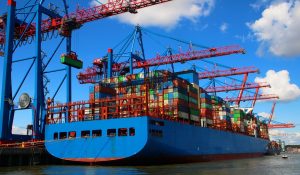International shipping is out-of-whack due to the pandemic, but self-reliance may be one of the best skills we learned in 2020, so let’s use it!
Driving through the countryside this weekend, I noticed more trees sporting spigots, tubing and buckets than anytime in recent memory. What’s making people look at the maple trees along their driveway and think, “Man, I’d tap that?” I suspect it’s the same urge that filled kitchens with the irresistible smell of baking bread a year ago, and inspired novice gardeners to tear up a sunny patch of grass and plant vegetables last summer. Widespread vaccine uptake may allow us to return to a semblance of pre-2020 normalcy soonish, but we can’t un-see the empty shelves and shortages that were many Americans’ first real experience of how brittle our supply chains can be in an emergency. If the pandemic opened our eyes and pushed us further toward self-reliance last year, that may be one of the best outcomes of the COVID crisis.
Truth is, we’re not out of the woods yet. Might want to make some syrup while we can.
The economic ripples from the pandemic are continuing to spread around the world. A year ago, masks were hard to find at any price, but once Chinese workers bounced back from the virus, factories there went into overdrive to supply the world with PPE. As office buildings closed and sent people home to work, demand for cheap office furniture soared. Container ships filled with cargo were unloaded at ports around the world, and empty shipping containers began to accumulate in ports from New Zealand to Los Angeles.
And there, they sit.

There is far more demand around the world for Asian exports than there is in Asia for what the rest of the world is selling. However, returning an empty shipping container across the Pacific is not cost-free, so containers once made the return trip stuffed with the West’s unwanted plastic and electronics waste. In 2017, when China decided that it was no longer worthwhile to serve as the world’s plastic recycler and announced it was no longer going to be taking our dirty trash, it became that much harder to find filler for Asia-bound containers.
However, the demand for containers in Asia is so hot that the quicker they can be sent back, the bigger the profit for shipping companies. The result is a lopsided international trade market, with empty containers languishing in some ports, American agricultural exports piling up due to a shortage of containers sent to pick them up, and Asian exports delayed because they can’t make or receive containers fast enough. This is why imported goods like cheese, olive oil, sporting goods, and furniture are harder to find and more expensive when they arrive. Bottlenecks of container ships waiting to be unloaded in ports short of workers due to COVID aren’t helping matters, either.
There’s another confounding factor present as well. China is entering another inward-looking phase. This year, the annual National People’s Congress in Beijing announced a policy agenda geared towards self-reliance in the coming years. They will focus more on domestic markets for their industrial output, rather than low-value international exports, while increasing the use of homegrown products and technology throughout the Chinese manufacturing base. While these policies could increase the standard of living for Chinese workers, the economic effects on the rest of the world will be profound.
All of which brings us back to local economies. On one hand, slowing the international circulation of goods will look a lot like deprivation for those used to cheap imports and a ready market for agricultural exports. On the other hand, the cornucopia of inexpensive goods we’re accustomed to accessing floats on an increasingly questionable flow of cheap fossil fuels. The ecological cost of burning them is rising steeply, and is unlikely to improve within our lifetimes. Perhaps self-reliance is an appropriate attitude to be cultivating nowadays, along with building resilient communities, because relocalization is a skill best practiced with the people around us.
Just remember, as the city of Ann Arbor has to remind residents every spring: tapping trees on public property is illegal. Perhaps working towards a more accessible commons would make self-reliance easier for all.
Related: So You Want to Start a COVID Farm?


Join the conversation!